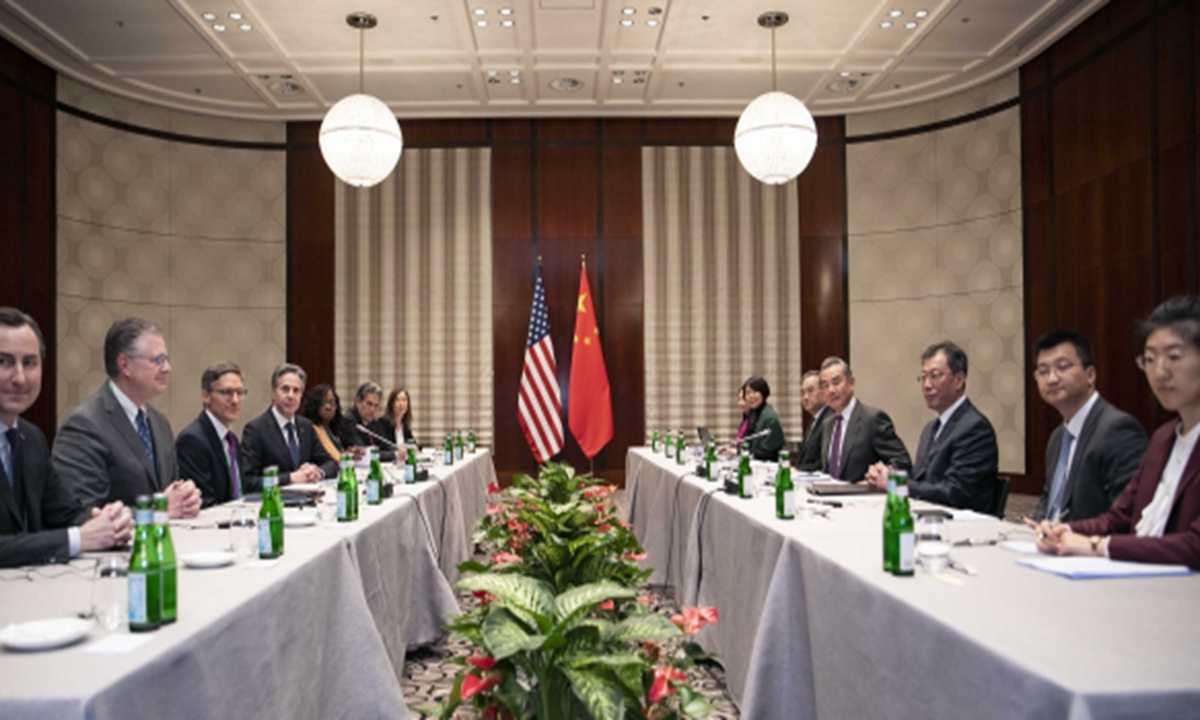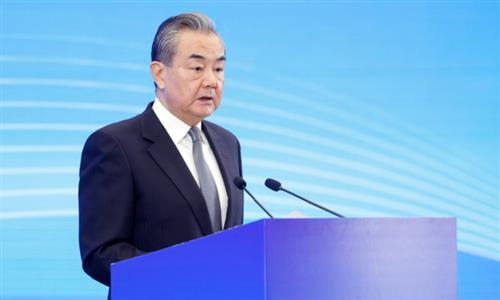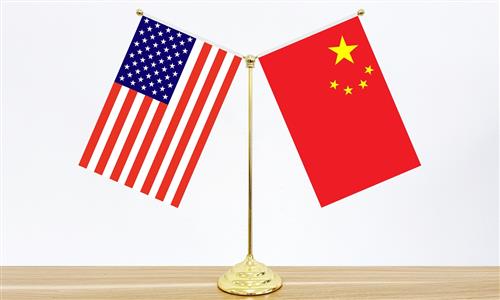Wang meets Blinken, calls for sound, steady, sustainable development of ties
Meeting marks another effort to manage disputes, stabilize ties and prepare for higher-level interactions

Chinese Foreign Minister Wang Yi, also a member of the Political Bureau of the Communist Party of China Central Committee, meets US Secretary of State Antony Blinken on the sidelines of the Munich Security Conference in Munich, Germany, on Feb. 16, 2024. Photo: Xinhua News Agency
During a meeting on Friday with US Secretary of State Antony Blinken on the sidelines of the ongoing Munich Security Conference, Chinese Foreign Minister Wang Yi called for a sound, steady and sustainable development of China-US ties. Chinese experts noted that as risks of both bilateral and international conflicts are on the rise, Wang's meeting with Blinken marks another round of efforts between China and the US in managing disputes, stabilizing ties and de-risking; it also paves way for more frequent and higher-level meetings between the two countries.Wang, also a member of the Political Bureau of the Communist Party of China Central Committee, said the most important task for both sides currently is to follow the strategic guidance of the two heads of state to make the "San Francisco vision" a reality, so as to promote a sound, steady and sustainable development of bilateral relations.
To this end, the two sides should adhere to the principles of mutual respect, peaceful coexistence and win-win cooperation and actively explore the right way for the two major countries to get along with each other, Wang noted.
The US side should view China's development objectively and rationally, and adopt a positive and pragmatic policy toward China, and implement President Biden's commitments into concrete actions, Wang added.
During the meeting, the two sides had candid, substantive and constructive discussions, according to Xinhua News Agecy.
The important signal being conveyed is the need to manage and stabilize the relationship between the two sides, while also exchanging views on major regional and global issues, so as to prevent overall global security from being completely undermined, Li Haidong, a professor at the China Foreign Affairs University, told the Global Times on Saturday.
Another signal from Wang's conversation with Blinken is to maintain the momentum of high-level meetings between the two countries, laying the groundwork for more frequent and higher-level interactions between officials in the future, according to Li.
A handout of the meeting between Wang and Blinken published by the US State Department said that both sides recognized the importance of maintaining open lines of communication between the two countries across a range of strategic issues, including consultations and high-level meetings in key areas in the coming months.
China and the US have continued to build momentum for interactions in various fields after the meeting of the two heads of state in San Francisco. However, the US sincerity toward improving ties with China has been widely questioned by Chinese experts. Li said the US has never abandoned its two-faced approach to China - seeking engagement with China while strengthening competition and keeping up provocations on certain issues, especially the South China Sea issue and the Taiwan question.
During his meeting with Blinken, Wang stressed that that there is only one China in the world and Taiwan is part of China's territory, which is the true status quo of the Taiwan question. He noted that what is trying to change the status quo are the "Taiwan independence" separatist activities and the connivance and support of external forces.
If the US genuinely hopes for stability across the Taiwan Straits, it should abide by the one-China principle and the three China-US joint communiqués, and carry out its commitment of not supporting "Taiwan independence," Wang said.
Speaking with the Global Times on Wednesday, Wu Shicun, president of the National Institute for South China Sea Studies, who is currently attending the Munich Security Conference, said that although the risk of conflicts for China and the US in the South China Sea is rising, both sides are trying to avoid such conflicts as it would be catastrophic for the world to bear. He warned that if the US is not willing to follow the current rules and keeps provoking on the South China Sea issue, such conflicts will be very likely in the future.
Li said Wang's emphasis on the Taiwan question is also to warn the US not to fan the flames on this question, as neither side wants the Taiwan question to become a new crisis in the Asia-Pacific region. Both sides are aware that Taiwan's newly elected regional leader Lai Ching-te will indeed inject a great deal of uncertainty into cross-Straits relations.
On the Taiwan question, experts pointed out that Lai's inauguration speech in May is worth noting. Wu said the US is also pressuring the island of Taiwan at various levels, so they won't go across the red line and give the Chinese central government more reasons to expedite the process of national reunification. Taiwan cannot act as it wishes and must take into account the pressure from the US, said Wu.
Wang and Blinken also agreed to continue promoting dialogue and consultation on foreign policies, Asia-Pacific affairs, maritime affairs and artificial intelligence, and maintain communication between the two militaries.
The two sides also exchanged views on the Ukrainian crisis, the Palestinian-Israeli conflict, the Korean Peninsula and other regional hot spot issues, and agreed to maintain contact between the two sides' special envoys for the Korean Peninsula affairs.




